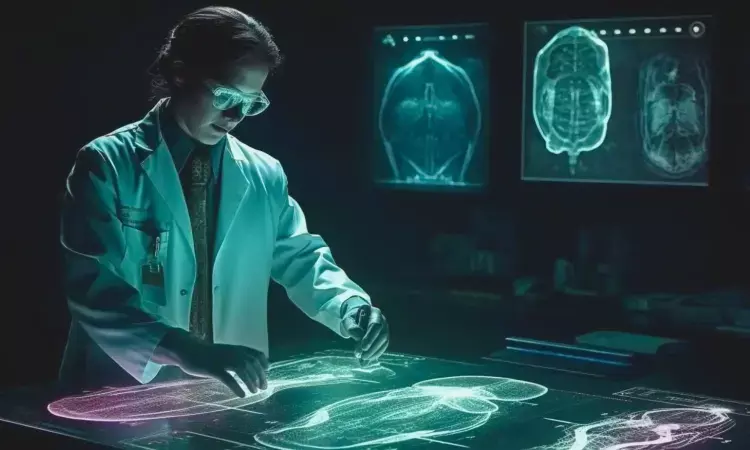- Home
- Medical news & Guidelines
- Anesthesiology
- Cardiology and CTVS
- Critical Care
- Dentistry
- Dermatology
- Diabetes and Endocrinology
- ENT
- Gastroenterology
- Medicine
- Nephrology
- Neurology
- Obstretics-Gynaecology
- Oncology
- Ophthalmology
- Orthopaedics
- Pediatrics-Neonatology
- Psychiatry
- Pulmonology
- Radiology
- Surgery
- Urology
- Laboratory Medicine
- Diet
- Nursing
- Paramedical
- Physiotherapy
- Health news
- Fact Check
- Bone Health Fact Check
- Brain Health Fact Check
- Cancer Related Fact Check
- Child Care Fact Check
- Dental and oral health fact check
- Diabetes and metabolic health fact check
- Diet and Nutrition Fact Check
- Eye and ENT Care Fact Check
- Fitness fact check
- Gut health fact check
- Heart health fact check
- Kidney health fact check
- Medical education fact check
- Men's health fact check
- Respiratory fact check
- Skin and hair care fact check
- Vaccine and Immunization fact check
- Women's health fact check
- AYUSH
- State News
- Andaman and Nicobar Islands
- Andhra Pradesh
- Arunachal Pradesh
- Assam
- Bihar
- Chandigarh
- Chattisgarh
- Dadra and Nagar Haveli
- Daman and Diu
- Delhi
- Goa
- Gujarat
- Haryana
- Himachal Pradesh
- Jammu & Kashmir
- Jharkhand
- Karnataka
- Kerala
- Ladakh
- Lakshadweep
- Madhya Pradesh
- Maharashtra
- Manipur
- Meghalaya
- Mizoram
- Nagaland
- Odisha
- Puducherry
- Punjab
- Rajasthan
- Sikkim
- Tamil Nadu
- Telangana
- Tripura
- Uttar Pradesh
- Uttrakhand
- West Bengal
- Medical Education
- Industry
AI may significantly aid health care clinicians inexperienced in lung ultrasound to obtain high-quality LUS clips: JAMA

A recent study published in JAMA Cardiology has concluded that artificial intelligence (AI) is capable of supporting trained health care professionals (THCPs) in drawing diagnostic-quality lung ultrasound (LUS) images similar to those collected by expert operators. This study was conducted by Cristiana B. and fellow researchers in the US.
Lung ultrasound has been found crucial for diagnosing the dyspnea-related causes such as cardiogenic pulmonary edema; however, the use is largely confined due to significant technical skills needed for performance. Several previous studies demonstrated AI potential as an important component for helping new users in acquisition of quality images in cardiac ultrasound.
This multicenter diagnostic validation study was conducted between July and December 2023 at four clinical sites. The patients aged 21 years or more with shortness of breath were recruited for two LUS examinations-one performed by THCPs with Lung Guidance AI software and the other by experts in LUS without AI assistance. Medical assistants, respiratory therapists, and nurses were standardized to use AI for LUS image acquisition before this study. Lung Guidance AI used deep learning algorithms to assist in image acquisition and B-line annotation, using an 8-zone LUS protocol to automatically acquire diagnostic-quality images. The main outcome measure was the proportion of diagnostic-quality examinations achieved by THCPs using AI, as adjudicated by a panel of five blinded expert LUS readers.
Results
• The study recruited 176 participants, aged median 63 years (SD 14), 81 females (46.0%), and mean BMI 31 (SD 8).
• The most important results from the intention-to-treat analysis are listed below.
Diagnostic Quality:
• 98.3% (95% CI, 95.1%-99.4%) of LUS examinations performed by THCPs with AI support were of diagnostic quality.
• The difference in diagnostic quality between THCPs and LUS experts was 1.7% (95% CI, −1.6% to 5.0%), and the difference was not statistically significant.
• The results demonstrate that AI support allowed THCPs to perform LUS at a quality equivalent to that of expert operators, thus overcoming the technical skills barrier to such imaging.
AI-assisted THCPs achieved diagnostic-quality lung ultrasound images comparable to those obtained by LUS experts in this multicenter validation study. Such findings further highlight the potential of AI to extend access to high-quality medical imaging, particularly in underserved areas where expert personnel are scarce. This innovation can improve the accuracy of diagnoses, streamline workflows, and improve patient outcomes for those with respiratory conditions.
Reference:
Baloescu C, Bailitz J, Cheema B, et al. Artificial Intelligence–Guided Lung Ultrasound by Nonexperts. JAMA Cardiol. Published online January 15, 2025. doi:10.1001/jamacardio.2024.4991
Dr Riya Dave has completed dentistry from Gujarat University in 2022. She is a dentist and accomplished medical and scientific writer known for her commitment to bridging the gap between clinical expertise and accessible healthcare information. She has been actively involved in writing blogs related to health and wellness.
Dr Kamal Kant Kohli-MBBS, DTCD- a chest specialist with more than 30 years of practice and a flair for writing clinical articles, Dr Kamal Kant Kohli joined Medical Dialogues as a Chief Editor of Medical News. Besides writing articles, as an editor, he proofreads and verifies all the medical content published on Medical Dialogues including those coming from journals, studies,medical conferences,guidelines etc. Email: drkohli@medicaldialogues.in. Contact no. 011-43720751


